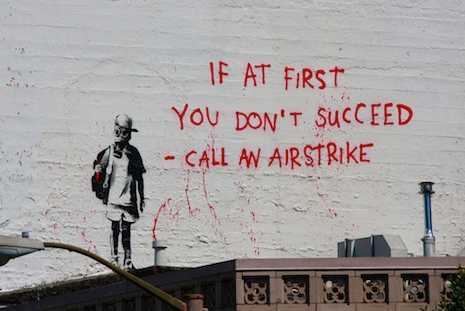
Picture: Radoslaw Lecyk/Shutterstock.com
It is relentless, the news about the wars. The pictures that stream into our living rooms and coffee shops through televisions and tablets are of beheadings, masked men ranting, 200,000 Syrians murdered, millions displaced fleeing for their lives under the cover of dust and horror. Filipinos and Fijians in the UN peacekeeping forces briefly figure in the news when they are attacked on the buffer zone between Israel and Syria.
New words find their way into our mouths: Islamic State, mission creep, bright yellow light, while some get twisted as when arms and ammunition are airlifted as "humanitarian aid." Old images crowd our heads: sex slavery and forced conversions, genocide, just aggression, Cerebus, Apocalypse. The bogeyman has come to town.
Our meaning makers don't or can't deliver. Barack Obama, himself leader of the most powerful nation on Earth says, "We don't have a strategy yet," apparently reluctant to start another war where no results are clear. Still, for the first time since 2011 the US made a military intervention in Iraq in August, ostensibly to avert a potential "genocide" of the northern Yazidi community.
The hostility among Islamic fundamentalists is itself the result of political and military failures of the United States and other governments that take up the role of "protector", a fact the pope knows full well.
In his response to a journalist's query on whether the chaos now calls for just aggression, Francis said: "How many times under this excuse of stopping the unjust aggressor have the powers taken control of nations? And they have made a true war of conquest." But Francis appears to have fallen foul of the media's relentless quest for a story when he tiptoed around this key consideration. We are bewildered.
Where you can, when you can, you take a deep breath, thankful you are able to meet and pray in peace to the God or gods of your choice, grateful you have a television set and a living room. Inside you cry an echo to Francis' call to "stop it" already!
How are we to think about this? There are no easy answers. This is a transnational guerrilla war, a political and military campaign that embeds itself not in empty deserts but in the hearts, minds and wills of people in as many as 74 nations. There are thousands of aggressors reportedly on the ground with fresh deployments as jihadists leave to recruit more from their countries - including Indonesia, Pakistan, India and the Philippines, and the prosperous nations in North America, Europe, Australia.
Churches have called for fervent prayer and have pleaded humanitarian aid for "our brethren" in Iraq and Syria. I've just talked with a refugee from Nineveh, whose ancestors have faced centuries of persecution, and that is all he asks - prayers and humanitarian aid.
But have those outside the immediate conflict zones been unceasing in the way we seek peace and justice? Around the world, churches would do well to draw attention to two events this September. This week NATO meets to discuss Syria and Iraq. But it only looks like more war is on the way. Australia, miles away from the Atlantic, is coming in as a partner in an extended NATO coalition. Surely the Body of Christ, the Church Universal with its dense partnership networks, could raise prophetic voices to speak of peace to power.
Churches could also follow the UN General Assembly debates on the sixth Secretary-General report: Fulfilling our collective responsibility: International assistance and the responsibility to protect. Drawn up in 2005 in the wake of the Rwandan genocide 20 years ago, the document lays out that apart from coercive military measures, there are many international tools to deal with genocide, crimes against humanity, war crimes and ethnic cleansing. There could be targeted sanctions, and treaties that control the flow of arms and humanitarian aid. There are also the ways of building peace and justice through development aid.
Seek peace, pursue justice. But take that a little further where you are. Each Sunday provides opportunities in liturgies and sermons; each school day, a time to shape values and ideals; each hour in front of television and social media, a chance to look critically at the narratives that bombard us.
It is not so much what to think about conflict, but how to think about it. Guard against corruption and misguided government priorities. Ensure that development funds go to build communities and societies that are just, inclusive and welcoming, participatory and robust. Work with people of other faiths. We do not have to be victims or aggressors. We can make history and let the world know.
Sophia Lizares Bodegon is a member of the Ecumenical Association of Third World Theologians (EATWOT) and currently works in lay and continuing education.


